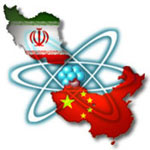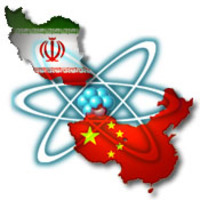 Washington Post: The Obama administration has concluded that Chinese firms are helping Iran to improve its missile technology and develop nuclear weapons, and has asked China to stop such activity, a senior U.S. official said.
Washington Post: The Obama administration has concluded that Chinese firms are helping Iran to improve its missile technology and develop nuclear weapons, and has asked China to stop such activity, a senior U.S. official said.
The Washington Post
By John Pomfret
Monday, October 18, 2010; A1
 The Obama administration has concluded that Chinese firms are helping Iran to improve its missile technology and develop nuclear weapons, and has asked China to stop such activity, a senior U.S. official said.
The Obama administration has concluded that Chinese firms are helping Iran to improve its missile technology and develop nuclear weapons, and has asked China to stop such activity, a senior U.S. official said.
During a visit to Beijing last month, a delegation led by Robert J. Einhorn, the State Department’s special adviser for nonproliferation and arms control, handed a “significant list” of companies and banks to their Chinese counterparts, according to the senior U.S. official, who spoke on the condition of anonymity to discuss a sensitive issue in U.S.-Chinese relations. The official said the Obama administration thinks that the companies are violating U.N. sanctions, but that China did not authorize their activities.
The Obama administration faces a balancing act in pressing Beijing to stop the deals and limit Chinese investments in Iran’s energy industry. U.S. officials say they need to preserve their ability to work with China on issues ranging from the value of its currency to the stability of North Korea. But the administration also wants to make progress in efforts to dissuade Iran from building a nuclear weapon and to convince other powerful states that China is not receiving lenient treatment because of its energy needs.
“My government will investigate the issues raised by the U.S. side,” said Wang Baodong, a spokesman for the Chinese Embassy.
Einhorn’s trip is part of a worldwide effort by the Obama administration to persuade countries to push Iran to enter into negotiations over its nuclear program, which the Islamic Republic says is peaceful. The Obama administration has cobbled together a growing network of countries and companies that have announced measures to cut investments in Iran.
China’s involvement in Iran’s energy sector and the role that some of its companies are believed to be playing in Tehran’s military modernization could disrupt U.S.-Chinese relations. In a recent meetings on Capitol Hill, China’s outgoing deputy chief of mission, Xie Feng, was told that “if he ever wanted to see Congress united, Democrats and Republicans, it would be on the issue of China’s interaction with Iran,” one participant said, speaking on condition of anonymity to disclose a private discussion.
After the U.N. Security Council authorized enhanced sanctions against Iran in June, the United States, the European Union, Japan, South Korea, Australia and Canada passed laws to further restrict investment in Iran’s energy sector. The U.S. law authorized the president to sanction any company found to be selling gasoline to Iran or that had invested $20 million or more in Iran’s energy sector. INPEX, the Japanese energy giant, announced last week that it was pulling out of Iran.
China thus becomes the last major economy with significant investments in Iran’s energy industry. Russia does not have major investments there and recently canceled the sale of an advanced antiaircraft missile to Iran, refunding the $900 million sticker price.
“China now is the only country with a major oil and gas industry that’s prepared to deal with Iran,” the U.S. official said. “Everyone else has pulled out. They stand alone.”
Each nation, particularly permanent members of the Security Council such as China, is responsible for abiding by the U.N. sanctions.
If one country does not, others can point out those failures, which is what Einhorn did. Other nations can also ban their companies from doing business with the wayward firms. The U.S. government did that at least 62 times with Chinese companies during President George W. Bush’s first term, generally regarding missile-technology deals with Iran.
The U.S. official speaking anonymously said U.S. intelligence thinks that Chinese companies and banks have been involved in providing restricted technology and materials to Iran’s military programs. He said that these deals occurred both before and after the enhanced U.N. sanctions were approved in June.
The U.S. official said that most of the deals concerned Iran’s missile program. However, a senior official from a Western intelligence agency said Chinese firms were also discovered selling high-quality carbon fiber to Iran to help it build better centrifuges, which are used in enriching uranium. The official said he had no information to corroborate that reporting.
The official declined to say how many companies were on the list or to name the companies. He added that some of the company names were provided to the Chinese as case studies of how sanctions were being violated and that others were cited as examples of “ongoing concerns.”
Other officials and analysts said the number of firms involved in not following sanctions was less important than the quality of the technology Iran was obtaining. In 2008, for example, Iran obtained 108 pressure gauges, which are critical to the functioning of a centrifuge, from one Chinese company.
A year earlier, a small company in the Chinese port city of Dalian provided Iran with a range of sensitive materials, including graphite, tungsten copper, tungsten powder, high- strength aluminum alloys and high-strength maraging steel, again for its nuclear program. That firm allegedly received payment from Iran via U.S. banks.
The U.S. official credited China with working hard to establish the bureaucratic structures and laws to control the export of sensitive technologies, but he said China so far has not devoted resources to crack down on violators.
“China has come a long way in putting in place an export-control system,” he said. “But it’s one thing to have a system that looks good on the books and it’s another thing to have a system that they enforce conscientiously. . . . Where China’s system is deficient is on the enforcement side.”
China is generally believed to have supplied Pakistan with a blueprint for a nuclear weapon in the 1970s. But Bonnie S. Glaser of the Center for Strategic and International Studies said most experts agree that since the late 1990s, China has taken the issue more seriously. Some have argued that President Bill Clinton’s administration persuaded China to embrace the issue because it was important to the United States. Others have said China itself understood that selling missile and nuclear weapons-technology, especially to neighbors such as North Korea, was a bad idea.
Both the Clinton and George W. Bush administrations determined that China’s government was no longer intentionally proliferating. That conclusion allowed Bush to open the door for U.S. nuclear-energy technology to be sold to China in contracts that are expected to be worth billions.
During the trip to China, the U.S. delegation also pushed oil companies, specifically the China National Petroleum Corp. and the China Petroleum & Chemical Corporation, to stop or limit their investments in Iran. Both firms have been in negotiations to invest billions in Iran’s energy sector although, according to Erica Downs of the Brookings Institution, it is unclear how much they have spent there.
The delegation informed the Chinese of the ramifications that the new U.S. law – the Comprehensive Iran Sanctions, Accountability, and Divestment Act of 2010 – might have for Chinese firms and banks that continued to conduct business in Iran.
“Any Chinese enterprise that has . . . a big stake in good business relations with the United States would have to be mindful of U.S. laws,” the U.S. official said.
Still, the official said, the U.S. delegation emphasized that China did not have to cut back on purchases of energy from Iran, from which China obtains around 8 percent of its oil. Nor does China need to end its “energy cooperation with Iran on a permanent basis,” he said.
“What we want is some near-term pragmatic restraint,” he said.
This approach, according to Downs, could spell trouble with European and Asian firms and their governments.
“What the Japanese and European companies are most concerned about is that they’ve left projects that are real prizes in Iran,” she said. “Their biggest concern is stepping away under pressure and having the Chinese go in.”
“We believe normal trade and economic cooperation with Iran that don’t violate U.N. resolutions should not be hurt or disturbed,” said Wang, the embassy spokesman.


